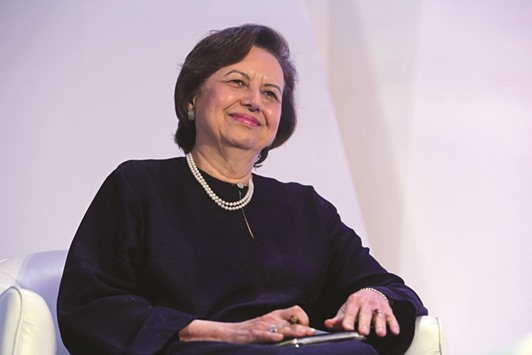Malaysia will meet its economic expansion target this year even as risks to global growth mount and greater volatility may persist in capital flows, central bank Governor Zeti Akhtar Aziz said.
Price pressures are “quite contained” due to lower fuel and commodity costs and slightly slower demand, Zeti said in an interview in Washington on Saturday. Until there is more clarity to the growth and inflation outlook, the current monetary stance remains accommodative and supportive, she said.
Zeti, who leaves her position at the end of the month when her term is up, has helped to curb inflation and keep monetary policy steady to support domestic demand. Prime Minister Najib Razak is counting on consumers to support growth, finding ways to put more money into their pockets as he faces constraints in increasing government spending.
“We have a high degree of confidence” on the 2016 growth target of 4% to 4.5%, Zeti said. While fuel prices may remain lower for some time, Malaysia’s diversified economy that focuses on more consumption-led industries than exports, and reduced dependence on energy revenues means “we are affected but to a much lesser extent than we would have been” in the past, she said.
Global finance ministers and central bankers pledged to step up their efforts to support growth, as chances rise of a broader slowdown and risks including refugee crises and a potential UK exit from the European Union threaten the world economy. Downside risks to the world economic outlook have increased since October, raising the possibility of a more generalized slowdown and a sudden pull-back of capital flows, the International Monetary Fund’s top policy advisory committee said Saturday.
Malaysia remains “vulnerable” to a reversal of capital flows though buffers such as a highly-developed bond market and strong financial intermediaries have helped to achieve adjustments in the exchange rate and in reserves, she said. The “prediction is greater volatility. That will continue,” she said.
The global recovery “is much more modest than had been earlier anticipated,” Zeti said. Uncertainty in world financial markets, if it continues, “makes it a challenge for businesses” and they’ll “stay on the sidelines” instead of investing, while households may delay consumption, all of which would contribute to slower growth, she said.
“Having heightened volatility for long periods of time is not conducive to growth,” she said.
The ringgit has risen about 10% this year to become the second best-performing currency in Asia, rebounding from a 17-year low. Global funds poured 6.1bn ringgit ($1.6bn) into Malaysian equities in March, after outflows of 19.5bn ringgit in 2015.
Concerns about the weaker world economic outlook, anticipation of further normalisation of US monetary policy by the Federal Reserve, and fuel price adjustments are among external factors weighing on Malaysia’s currency, according to Zeti.
“Right now, it doesn’t reflect our fundamentals,” she said, adding that the nation has a current account surplus, relatively low foreign indebtedness and a high level of foreign exchange reserves. With steady growth, low inflation and an improving fiscal position, “the currency would be stronger if it was reflecting our fundamentals,” she said.
Bank Negara left the benchmark interest rate unchanged at 3.25% at Zeti’s last scheduled monetary policy decision in March as accelerating inflation reduced scope for a cut in borrowing costs.
The central bank ordered lenders to set aside less cash as reserves from February as policy makers sought to add more money in the financial system amid weakening growth. The move to cut the statutory reserve ratio has had an impact, Zeti said.
“There is potential to do more,” she said. “But right now it has stabilised liquidity conditions in our financial markets.”
Investors periodically dumped Malaysia’s stocks, bonds and currency last year, in part as allegations of financial irregularities at a state investment company 1Malaysia Development hurt sentiment and reports of hundreds of millions of dollars that appeared in Najib’s accounts in 2013 sparked political tensions.
The premier and 1MDB have repeatedly denied wrongdoing.
Zeti had become increasingly critical about the affairs of 1MDB, whose advisory board is chaired by Najib. The central bank had at least twice proposed criminal proceedings against 1MDB, something the attorney general dismissed as it concluded there was no wrongdoing.
The government hasn’t announced who will replace Zeti when she steps down from the central bank at the end of this month after 16 years at the helm. A governance committee under the auspices of Bank Negara Malaysia has the responsibility of vetting internal and external candidates before Najib’s government picks one to be endorsed by the king.
The governance committee, tasked to vet candidates, has submitted the recommendation on her successor and it’s now up to the government to decide, Zeti said last month.
“The person should have the best credentials for this current environment,” she said on Saturday, when asked if she’d prefer an internal or external candidate to replace her. “We’re all waiting with bated breath for the announcement.”

Zeti: Concerns about the weaker world economic outlook.
